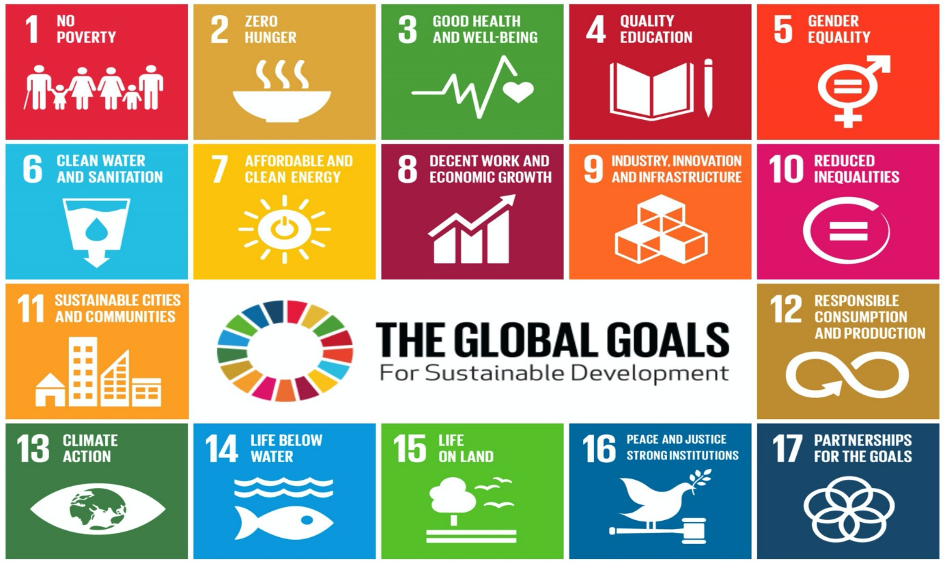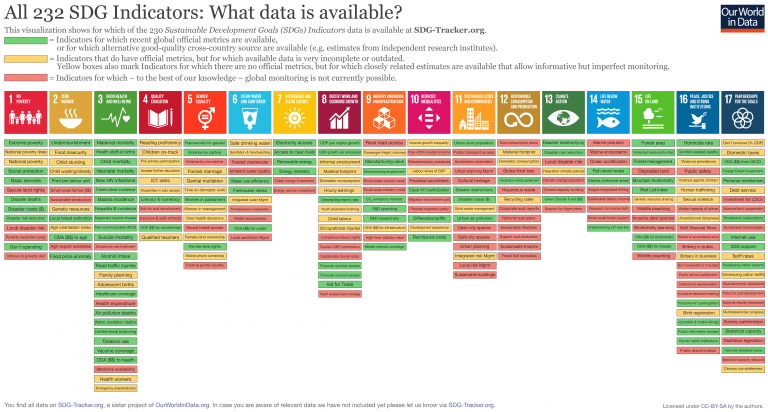What are the Sustainable Development Goals?
The Sustainable Development Goals (SDGs) are 17 global goals, with 169 associated targets, that were adopted by all United Nations Member States in 2015 as a universal call to action to end poverty, protect the planet and ensure that all people enjoy peace and prosperity (UN 2015). The SDGs came into effect in January 2016 and will continue to guide UN policy and funding until 2030.The The goals are interconnected which implies that developments and changes in one goal affects the outcome also in some or many of the others.

As can be seen from the figure above, the 17 goals cover all societal areas reaching from “No poverty” (SDG 1) to “Gender Equality” (SDG 5), “Climate Action” (SDG13), “Life on Land” (SDG 15), and “Peace and Justice and Strong Institutions” (SDG 16) only to mention a few of the areas and goals. These again cover of the goals 169 targets and include 232 indicators as shown in the figure below.
Measuring the progress on the UN’s 17 Sustainable Development Goals based on the 169 targets and 232 indicators requires broad collaboration within the global data community. As can be seen from the figure from “Our World in Data” the availability of methods and data for the respective indicators to measure the goals are highly diverse and do also vary significantly in different countries. The indicators are classified into three tiers:
- Tier 1: Indicator is conceptually clear, has an internationally established methodology and standards are available, and data are regularly produced by countries for at least 50 per cent of countries and of the population in every region where the indicator is relevant.
- Tier 2: Indicator is conceptually clear, has an internationally established methodology and standards are available, but data are not regularly produced by countries.
- Tier 3: No internationally established methodology or standards are yet available for the indicator, but methodology/standards are being (or will be) developed or tested.

How can the RDA contribute to the SDGs?
The RDA home pages states that: “With more than 11.000 members from 145 countries RDA provides a neutral space where its members can come together through focused global Working and Interest Groups to develop and adopt infrastructure that promotes data-sharing and data-driven research, and accelerate the growth of a cohesive data community that integrates contributors across domain, research, national, geographical and generational boundaries” (https://www.rd-alliance.org/about-rda). The RDA members, Interest Groups and Working Groups are represented by members from a variety of academic disciplines, technological expert areas, research and data infrastructures, universities, libraries, funders, etc. who pursue the goal to make data accessible around the globe. Since its establishment in 2013 Interest and Working groups have pursued collaboration across domains and nations to the benefit of open science. The RDA thus has a unique basis for making a substantial contribution to the SDGs as it represented by individuals and organisations who through their activities and expertise possess valuable knowledge which can guide evidence-based policy implementations.
In order to coordinate the SDG relevant activities within the RDA as well as consolidate the extensive network of external partnerships of the RDA members the “RDA for the Sustainable Development Goals Interest Group” was established in 2019 and endorsed in 2020.
What are the goals of the “RDA for the SDGs IG”?
Although only recently endorsed SDG related activities have been part of RDA activities in the past years such as in the following IGs and WGs:
- Data for Development IG
- Indigenous Data Sovereignty Group
- Small Unmanned Aircraft
- Health Data IG
- Reproducible Health Data Services Working Group
- RDA/Codata Data Science Summer Schools
Furthermore, the SDGs have been directly and/or indirectly addressed at various plenaries. Some examples are:
RDA 16th Plenary Breakout session – 5:00 – 6:30 PM UTC | Breakout 3 – Tuesday, 10 November 2020
“RDA for the Sustainable Development Goals”, at the 14 RDA Plenary Session, Helsinki, Finland, 22-25.10. 2019.
“RDA for SDGs” slot during the RDA 14th Plenary Adoption Session, Helsinki, 2019.
RDA Plenary 13 “Data for Sustainable Development: Opportunities, Challenges and Responsibilities.” (2019). YouTube. Retrieved 6 June 2019, from https://www.youtube.com/watch?v=PaAQhjsMPdc&feature=youtu.be
“Data for Sustainable Development Goals and RDA Connections” at the RDA Plenary Session, Philadelphia, USA, 2-4.4.2019.
„Capacity Building for Data Management and Participation in International Surveys in Africa“ at the RDA Plenary Session ,Garbone, Botswana, 5-9.11. 2018.
“Sustainable Development Goals (SDG) Data at the Subnational Level”, SciDataCon, Gaborone, Botswana, 5-8.11. 2018.
„Ethics in FAIR Data: Ethical and practical issues o fdata sharing and usage within and across disciplines“ at the RDA PlenarySession, Berlin, 22.3. 2018.
„Data sharing needs, requirements, and projects in developing countries“ at the RDA 10th Plenary session, Montreal, Canada,19.9. 2017.
Also SDG related work was conducted by the “Ambassador for the Sustainable Development Goals” 2019-2020 within the RDA Europe 4,0 European funded project . Aims and goals can be found here: https://www.youtube.com/watch?v=zBkgpJcZizM and here: https://www.rd-alliance.org/ingvill-constanze-mochmann
Based on this preliminary work, the RDA for the SDG IG will amongst others focus on the following activities:
- Create materials to support the implementation of RDA outputs and recommendations within the social and technical work of the UN surrounding the sustainable development goals. These materials will be aimed to support the work of data managers, statisticians, research policy advisers and advocates, and diverse project managers supporting SDG data infrastructure and data use.
- Facilitate organizational collaboration/support with the U.N. and its agencies partnerships in commercial, academic, and NGO space. Facilitating such partnerships will Increase the visibility of the RDA on a global scale, providing precedence for future collaboration with additional IGOs and NGOs. RDA’s OAB, TAB, Council, Secretariat, and group membership could all play a role in facilitating such partnerships.
- Build collaborative partnerships across RDA interest groups and working groups working within the field of capacity development in low and middle income countries, furthering progressing RDA’s mission.
For further information on the RDA for the SDG IG please see here: https://www.rd-alliance.org/group/rda-sustainable-development-goals/case-statement/rda-sustainable-development-goals-ig-charter
